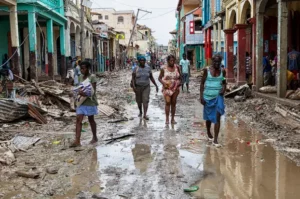
[ad_1]
Within the nineteenth century, Haiti launched into a debt journey that casts a protracted shadow over its financial growth at present.
Initially saddled with a large indemnity to France for its independence, the debt’s repercussions are nonetheless felt.
Nonetheless, Haiti’s previous features a distinctive burden. In 1825, France demanded 150 million francs as compensation for misplaced land and slaves, a sum that dwarfed the younger nation’s finances.
This debt, facilitated via loans from French banks, finally grew to become a part of the portfolio of Nationwide Metropolis Financial institution, now Citibank.

Not like money owed that fund infrastructure, Haiti’s repayments have been basically for its proper to exist as a nation.
By 2022, The New York Occasions estimated the reparations because of Haiti may vary from 21 billion to 115 billion present {dollars}.
MIT historian Malick Ghachem highlighted one other legacy of this debt: the dominance of the U.S. greenback in Haiti’s economic system, undermining the native foreign money, the gourde.
Regardless of remittances being exchanged into gourdes, the greenback stays the foreign money of the elite, contributing to cycles of devaluation and inflation that hurt the economic system.
Navigating Haiti’s Challenges
Ghachem means that worldwide assist, together with foreign money stabilization efforts from the Eurozone and the U.S., may assist strengthen the gourde.
But, the complexity of Haiti‘s state of affairs, compounded by political chaos and the shortage of state providers, poses important challenges.
As much as 80% of public providers are supplied by overseas NGOs, rising because the devastating 2010 earthquake.
This reliance on exterior support has stifled native establishments and perpetuated dependency.
Corruption additional complicates efforts to rebuild. Worldwide support directed in direction of overseas NGOs and the concealment of wealth by Haiti’s elite hinder progress.
Import dependence has additionally weakened native agriculture, suggesting a necessity for tariff changes to guard home industries.
Addressing these points requires a multifaceted method that features supporting native establishments, selling transparency, and re-evaluating support practices.
As Haiti continues to navigate its complicated historical past and present challenges, the worldwide group’s position in providing efficient assist stays essential.
[ad_2]